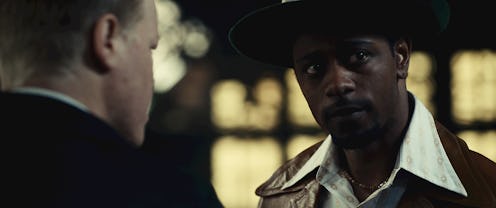TV & Movies
How LaKeith Stanfield Looked Past His Judas And The Black Messiah Character's Betrayal
"[I] didn’t want to run into the issue of going with my initial assumption, which is, 'Oh yeah, he’s just a snitch.'"

HBO Max's latest film Judas and the Black Messiah follows William O'Neal, a small-time criminal who, when he was arrested for car theft in 1968, was given an ultimatum: go to jail for a number of years, or infiltrate the Illinois chapter of the Black Panther Party and work as an informant for the FBI. O'Neal chose the latter and intertwined himself into the workings of the Black Panthers in Chicago and into the life of Chairman Fred Hampton, played by Daniel Kaluuya in the film. Judas and the Black Messiah tells the story of a single year over the course of Hampton's leadership, the party's clashes with the public and police, and O'Neal's eventual involvement in Hampton's death.
O'Neal became the "Judas" to Hampton's "Black Messiah," but the element of betrayal isn't what Stanfield chose to focus on in his portrayal. As the actor told Slate, "[I] didn’t want to run into the issue of going with my initial assumption, which is, 'Oh yeah, he’s just a snitch, and that's it.' I wanted to try and find the more nuanced parts of who he was, even though he didn’t show very much of that. I wanted to kind of try and bring that out if I could."
As is shown in the film, after effectively becoming a Black Panther, becoming a confidant and friend of Hampton's, O'Neal would eventually contribute to the FBI raid on Hampton's apartment that led to Hampton's death at only 20 years old.
"To me, William O'Neal is what most people are — when faced with choosing to do the courageous thing or the thing that saves your ass, I think most choose to save their asses," Stanfield says in the film's press notes. "That doesn’t make us bad, it’s just how we are. And that is what sets guys like Fred Hampton apart from O'Neal and most people. Hampton takes the Road Less Travelled. He makes all of his decisions holding steadfast to certain principles. O'Neal is human and chooses the path of self-interest, trying to protect himself. In the end, it becomes about him trying to survive."
O'Neal rarely spoke about his time with the Black Panthers. But in 1990, he was interviewed on camera for an episode of the PBS series Eyes on the Prize 2: America at the Racial Crossroads 1965–1985, which chronicled events in the Civil Rights movement. It was the only interview he ever gave about the incident and his involvement with the Black Panthers. On the night that the series premiered, O'Neal died by suicide, according to the Chicago Tribune. He was 40 years old.